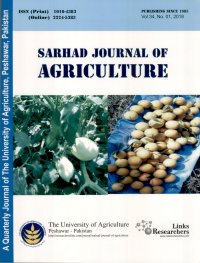Assessment of Irrigation Development in the Small Dams Command Area: A Case Study of Palai Dam, District Charsadda
Muhammad Jamal Nasir*, Atiq Ur Rahman and Anwar Saeed Khan
ABSTRACT
The total cultivated area of Khyber Pakhtunkhwa is 1.65 million hectares out of which only 0.86 million hectares are irrigated while the remaining 0.79 million hectares have no permanent water for agriculture and mostly dependent on rainfall for irrigation. The development and management of water resources are of extreme importance for the sustainable development of agriculture specifically in rain-fed areas. Palai dam is a small irrigation dam, constructed on River Jindi, some 40 km north of Charsadda town. The present study is an attempt to evaluate the impact of the Palai dam on the irrigation system of selected villages of tehsil Tangi. The study is based on an analysis of revenue data acquired from revenue office Tangi, between 2008-09 to 2016-17. The geospatial analysis of collected data is done using the software ArcGIS 10.5.2. The analysis revealed a tremendous increase in canal irrigated area. Before construction of the dam in 2008-09, the canal irrigated area in Palai Nasratzai was 138 acres (5.39% of the total cultivated area), which increased to 1348 acres (52% of the total cultivated area) after construction of the dam in 2016-17. During the same period, the rain-fed area decreased from 1791 acres to 604 acres. A similar trend was identified in village Qilla, where before the dam construction, there was no concept of canal irrigation, but after the dam construction, 64.36 % of cultivated land is now being irrigated through the Palai irrigation canal. Similarly, the tubewell irrigated area decreased from 87.29 % to 30.07% of the irrigated area after the dam construction.
To share on other social networks, click on any share button. What are these?







